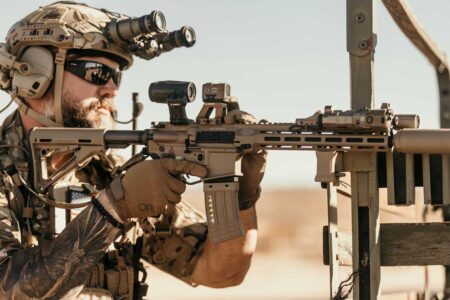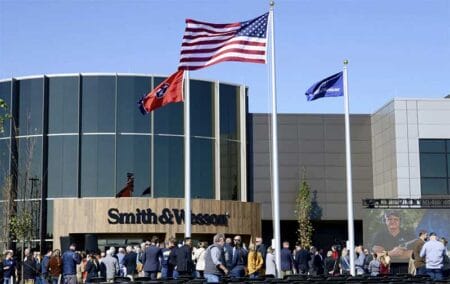
What Does Protection of Lawful Commerce in Arms Act Solve for America, and why are the anti-gunners so desperate to repeal it?
The PLCAA (Protection of Lawful Commerce in Arms Act) is a critical law enacted in 2005 to protect firearms manufacturers, distributors, and dealers from frivolous and abusive lawsuits aimed at holding them liable for the criminal misuse of their products. By ensuring that manufacturers and sellers are not punished for crimes committed by third parties using legally manufactured and sold firearms, PLCAA upholds basic principles of justice and fairness in American jurisprudence.
Why Are Anti-Gunners So Desperate to Repeal the PLCAA?

The fervent push to repeal the Protection of Lawful Commerce in Arms Act (PLCAA) reveals the true intentions of anti-gun activists: to dismantle the firearms industry by weaponizing the legal system. Their desperation stems from a combination of ideological motivations and strategic goals designed to curtail Americans’ Second Amendment rights indirectly. Here’s why they are so eager to see the PLCAA overturned:
1. They Can’t Win Through Legislation
Despite relentless lobbying efforts and millions of dollars spent, anti-gunners have largely failed to pass sweeping gun control legislation on a national level. The American public continues to support the right to bear arms, as evidenced by robust firearm sales and polling data showing opposition to draconian gun laws. Without legislative victories, anti-gun activists see the courts as a backdoor method to achieve their goals. By repealing the PLCAA, they could sue the firearms industry into submission, bypassing the democratic process altogether.
2. Bankrupt the Industry, Kill the Supply
The goal of repealing the PLCAA isn’t to achieve justice—it’s to bankrupt gun manufacturers through an avalanche of lawsuits. Even frivolous lawsuits are costly to defend, and with enough legal attacks, the industry could be brought to its knees. This tactic mirrors what was attempted against the tobacco industry but with a more sinister twist: crippling the lawful production of firearms would directly undermine the ability of law-abiding Americans to exercise their Second Amendment rights.
3. Shift Responsibility Away from Criminals
Anti-gunners thrive on blaming the tool, not the criminal. Repealing the PLCAA would allow them to shift responsibility for violent crime away from individuals who misuse firearms and onto manufacturers who had no role in those crimes. This narrative enables them to demonize the firearms industry while sidestepping conversations about the root causes of crime, such as repeat offenders, mental health issues, and lenient prosecution of violent criminals.
4. Suppress Gun Ownership by Driving Up Costs
If the PLCAA were repealed, the financial impact on manufacturers would inevitably be passed on to consumers. Firearms would become prohibitively expensive due to skyrocketing legal costs, pricing out lower- and middle-class Americans from the ability to defend themselves. This would disproportionately harm minorities, women, and vulnerable individuals who rely on affordable firearms for personal protection.
5. Weaponize Lawsuits as a Political Tool
Anti-gun activists know that even if many lawsuits fail, the negative publicity surrounding them would provide ammunition for their broader political agenda. Endless litigation would create a chilling effect on manufacturers, discouraging innovation, marketing, and distribution out of fear of liability. This climate of fear would achieve what anti-gunners have long sought: a weaker, less confident firearms industry unable to defend itself or its customers.
6. Undermine the Second Amendment Without Repealing It
By repealing the PLCAA and exposing manufacturers to legal annihilation, anti-gunners could undermine the Second Amendment without the need for constitutional amendments or legal precedents. The strategy is simple: no guns can be used if no guns are made. This indirect attack on the right to keep and bear arms bypasses the judiciary’s scrutiny of anti-constitutional laws and avoids the political fallout of directly opposing the Bill of Rights.
Myth vs. Fact
Myth: The gun industry enjoys special immunity from legal accountability.
Fact: The PLCAA does not provide “special immunity” but instead ensures that the firearms industry is treated like other lawful industries. Just as car manufacturers aren’t sued because a drunk driver misuses a vehicle, or knife manufacturers aren’t liable for stabbings, the firearms industry shouldn’t be punished for criminal actions it did not commit or endorse.
Why PLCAA Exists
Preventing Frivolous Lawsuits
Before the PLCAA, anti-gun groups and activists coordinated a wave of lawsuits designed not to achieve justice but to bankrupt firearms companies through legal fees. The courts are not instruments for political agendas, and the PLCAA ensures they cannot be misused this way.
Protecting Lawful Commerce
PLCAA maintains the free flow of goods and commerce for a constitutionally protected industry. Firearms manufacturers produce tools for lawful self-defense, hunting, sport shooting, and law enforcement. Attacks on this industry could disrupt supply chains critical to public safety.
Accountability Still Exists
Protection of Lawful Commerce in Arms Act includes explicit exceptions, holding gun manufacturers and sellers liable in cases of:
- Defective products causing harm (e.g., if a firearm malfunctions).
- Criminal violations, such as selling firearms to prohibited persons or knowingly violating federal regulations.
- Breach of contract or warranty in sales.
Far from providing blanket immunity, PLCAA reinforces the need for compliance with existing laws while preventing baseless legal harassment.
Rebutting Common Criticisms
Claim: The gun industry is “irresponsible, reckless, and negligent” in sales practices.
Truth: Federal laws such as the Gun Control Act of 1968 and the National Firearms Act already impose strict regulations on the sale, distribution, and manufacture of firearms. Dealers must conduct background checks, maintain detailed sales records, and comply with stringent oversight by the Bureau of Alcohol, Tobacco, Firearms and Explosives (ATF). Cases of actual negligence can still be pursued under PLCAA exceptions.
Claim: PLCAA prevents innovation in firearm safety.
Truth: The firearms industry continually innovates to improve safety. From trigger locks to biometric safes and smart gun technology, private companies develop and market safety solutions that empower responsible gun owners. Blaming PLCAA for a lack of innovation ignores the economic realities of consumer demand and the complexities of implementing unproven technologies.
Claim: No gun manufacturer has gone to trial for negligence since PLCAA’s passage.
Truth: This is because PLCAA rightly bars frivolous lawsuits that seek to hold manufacturers liable for crimes committed by third parties, not because manufacturers are immune to accountability. Lawsuits involving legitimate claims, such as defective products, can and do proceed.
The Broader Implications of Repealing PLCAA
Repealing PLCAA would unleash a flood of politically motivated lawsuits against a lawful and constitutionally protected industry. The goal of these lawsuits is not justice but the financial ruin of manufacturers, leading to decreased availability of firearms for law-abiding citizens. Moreover, this would set a dangerous precedent, allowing other industries to be targeted for misuse of their products—potentially crippling commerce across sectors.
Don’t Believe the Lies
The PLCAA is not a “special immunity” law; it is a safeguard against abuse of the judicial system. Repealing it would erode constitutional protections, harm lawful businesses, and undermine Americans’ ability to exercise their Second Amendment rights. Instead of targeting the firearms industry, policymakers should focus on addressing the root causes of crime and strengthening the enforcement of existing laws to keep guns out of the hands of criminals.
The desperation to repeal the PLCAA highlights the anti-gun movement’s broader strategy: to undermine the Second Amendment through economic and legal sabotage. Defending the PLCAA is not just about protecting the firearms industry—it’s about safeguarding the rights of law-abiding citizens, preserving due process, and preventing the abuse of the judicial system for political gain. Americans must recognize the stakes and reject these underhanded tactics aimed at eroding their freedoms.
For further reading:
- Bureau of Alcohol, Tobacco, Firearms and Explosives (ATF): Gun Control Act of 1968
- National Shooting Sports Foundation (NSSF): The Truth About PLCAA
NSSF Factsheet: Dispelling The Myths: Protection Of Lawful Commerce In Arms Act (PLCAA)






NO industry should be criminally nor civilly liable for misuse of their products by end-users and anyone who tries to pollute the courts with such frivolous cases should be facing large fines and possible jail time, as well as civil suits from others whose cases were delayed by these idiots’ actions.
Claim: No gun manufacturer has gone to trial for negligence since PLCAA’s passage.
Truth: Lawsuits involving legitimate claims, such as defective products, can and do proceed.
An example is the only valid rebuttal to an assertion that no examples exist.
I know it would be embarrassing to NSSF’s membership, but the organization should curate a collection of case law citations, with results.
That would put this claim permanently to rest.
If the soon to be GOP trifecta in DC, repealed this, it’d destroy the party. They’d lose what little credibility they have left.
Read a article that Sig Sauer had to pay out a $10 million dollar lawsuit on its Sig P320. It said the pistol fired by itself. It didn’t go into detail but did say several more lawsuits against the Sig P320. So if a firearm malfunctions, the company is responsible. But why would the firearm industry be responsible for criminals using their products? Is Ford or GM responsible for drunk drivers causing accidents? I read in a trade magazine, a interview with Bill Ruger, where he responded to the gun banners claiming he was selling handguns to gang members off… Read more »